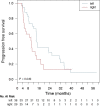Clinico-pathological associations and concomitant mutations of the RAS/RAF pathway in metastatic colorectal cancer
- PMID: 31036005
- PMCID: PMC6489172
- DOI: 10.1186/s12967-019-1879-2
Clinico-pathological associations and concomitant mutations of the RAS/RAF pathway in metastatic colorectal cancer
Abstract
Background: Over the past few years, next-generation sequencing (NGS) has become reliable and cost-effective, and its use in clinical practice has become a reality. A relevant role for NGS is the prediction of response to anti-EGFR agents in metastatic colorectal cancer (mCRC), where multiple exons from KRAS, NRAS, and BRAF must be sequenced simultaneously.
Methods: We optimized a 14-amplicon NGS panel to assess, in a consecutive cohort of 219 patients affected by mCRC, the presence and clinico-pathological associations of mutations in the KRAS, NRAS, BRAF, and PIK3CA genes from formalin-fixed, paraffin-embedded specimens collected for diagnostics and research at the time of diagnosis.
Results: We observed a statistically significant association of RAS mutations with sex, young age, and tumor site. We demonstrated that concomitant mutations in the RAS/RAF pathway are not infrequent in mCRC, and as anticipated by whole-genome studies, RAS and PIK3CA tend to be concurrently mutated. We corroborated the association of BRAF mutations in right mCRC tumors with microsatellite instability. We established tumor side as prognostic parameter independently of mutational status.
Conclusions: To our knowledge, this is the first monocentric, consecutively accrued clinical mCRC cancer cohort tested by NGS in a real-world context for KRAS, NRAS, BRAF, and PIK3CA. Our study has highlighted in clinical practice findings such as the concomitance of mutations in the RAS/RAF pathway, the presence of multiple mutations in single gene, the co-occurrence of RAS and PIK3CA mutations, the prognostic value of tumor side and possible associations of sex with specific mutations.
Keywords: Anti-EGFR; Concomitant mutations; Extended RAS; Metastatic colorectal cancer; RAS/RAF pathway.
Conflict of interest statement
The authors declare that they have no competing interests.
Figures




References
-
- Sorich MJ, Wiese MD, Rowland A, Kichenadasse G, McKinnon RA, Karapetis CS. Extended RAS mutations and anti-EGFR monoclonal antibody survival benefit in metastatic colorectal cancer: a meta-analysis of randomized, controlled trials. Ann Oncol. 2015;26(1):13–21. doi: 10.1093/annonc/mdu378. - DOI - PubMed
MeSH terms
Substances
LinkOut - more resources
Full Text Sources
Medical
Research Materials
Miscellaneous

